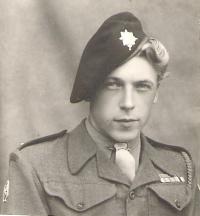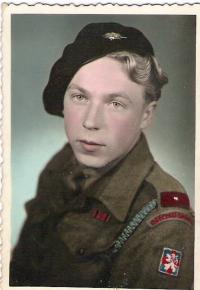I would like everyone to realize that some people, a lot of them in fact, died during the war A better life was ahead of them but they chose to fight for their belief instead It was a rough time for all of us who lived through it
Mr. Karel Zmija was born on January 11th 1926 in Guty village in Tesin (Teschen) region. His father married his brother’s wife - his brother died during the WW I - who had already three children. After seven years of this marriage another child arrived, Mr. Karel Zmija. He attended both Czech and Polish schools and in 1939 was accepted to polish gymnasium in Tsechen. Due to the fact, that his parents accepted Silesian nationality and have been listed in so-called Volkslists (Signing the Volkslist made the average Pole who signed up, give up his Polish nationality and was considered as a proof of his self-perception to be German and had the desire to become German in the National Socialist mould), Mr. Zmija had to enter the German army on March 30th 1944 when he was only 18 years old. He served on the Atlantic coast not far from Bordeaux and participated on the Normandy defense battles on June 6th 1944. Particularly he remembers the seven day struggle of his five men German troop, who found themselves in the middle of the enemy’s command center and tried to fight through them back on the front. However Mr. Zmija took an advantage of the situation and deserted the American side. He spent a short time of the war as a war prisoner. He remembers the forced labor under the French supervision as well as the cattle box transportation with no sanitation as well as hunger. Later on he managed to enter the Czechoslovakian army and on November 4th 1944 he arrived to Great Britain. After short military training he was sent to Dunkerque and fought among the tank units. Then he stayed in France until the end of the war. Shortly after the war was over he returned back home. He left the army for good and worked in metalwork factory.



